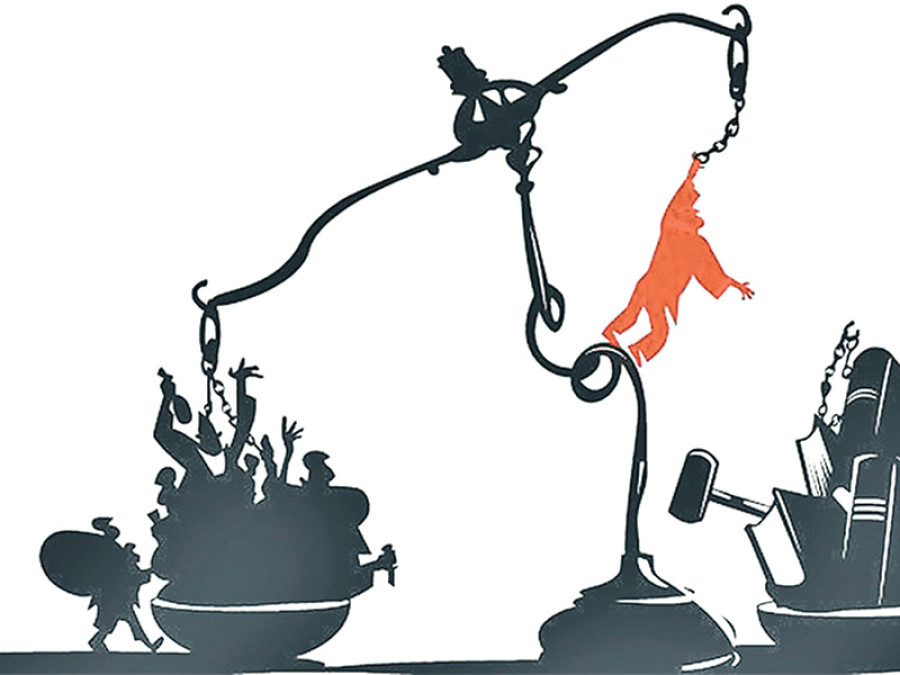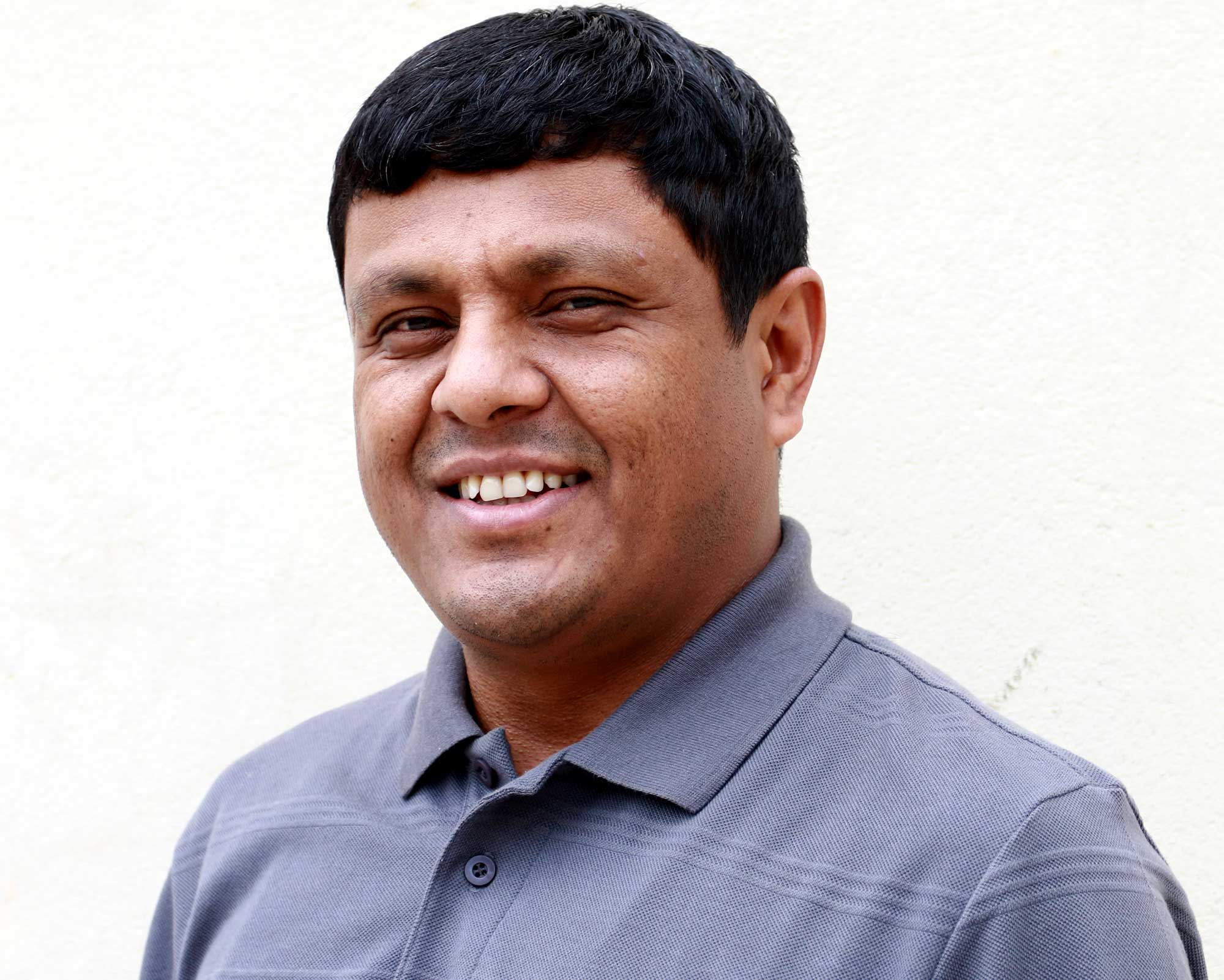Opinion
Rivalry in high places
Discussing the politicisation of the judiciary and judicialisation of politics in Nepal
Ram Kumar Bhandari
The long standoff between the executive and the judiciary has ended with the ruling parties withdrawing the impeachment motion against Supreme Court Chief Justice Sushila Karki in the name of ‘political consensus’. However, this has raised a serious question about the independence of the judiciary and the politicisation of the courts in the name of parliamentary supremacy.
The ruling parties had accused thechief justice of being biased in her selection of judges to examine high profile political and corruption cases. NC President and Prime Minister Sher Bahadur Deuba was the main architect of the impeachment motion.
Their main grievance was that the Supreme Court had rejected the government’s appointee to the post of police chief. On April 30, Chief Justice Karki also decided to prosecute three former police chiefs on corruption charges. Likewise, Karki issued an arrest warrant against former Maoist parliamentarian Bal Krishna Dhungel who had been at large despite a court order for his arrest. All three major parties—the NC, the CPN-UML and the Maoist Centre—have always been seeking political protection for their mutual benefit. Hundreds of court cases related to conflict-era crimes have been withdrawn, allowing officers involved in war crimes to walk. This demonstrates lack of political will to confront perpetrators and represents denial of justice.
Big shame
Hundreds of alleged perpetrators still remain in their official positions and benefit from the authorities without trial. The failure of the Nepali authorities to bring them to justice is a big shame. To date, not a single perpetrator suspected of criminal responsibility for serious human rights violations or crimes under international law committed during the Maoist conflict has been brought to justice in a criminal court. The actors are divided and raise issues based on their interest, which is a serious obstacle to the struggle for justice. This has been a big challenge for the social justice movement, truth seeking and ongoing transitional justice process.
In 2013, the then chief justice Khilraj Regmi was appointed as the head of the council of ministers and acted as the chief executive of the government and the chief of the judiciary. He introduced a Truth and Reconciliation Commission (TRC) ordinance to grant amnesty for ‘political’ crimes that damaged the credibility of Nepal’s independent judiciary.
The politicisation of the court system has not only damaged the judiciary but also affected the appointment process of judges to the apex court and high courts in recent years. This is a new beginning in the debate over the politicisation of the judiciary and judicialisation of politics. Both the judiciary and the executive have felt threatened, and have challenged each other in a game without principles.
Recent events
On May 1, four former Supreme Court chief justices including Anupraj Sharma, chairman of the National Human Rights Commission (NHRC), issued a joint press statement that said, “The impeachment is biased and has a vested political interest in that the impeachment motion has been registered by compromising judicial independence and with the intent ofweakening the judiciary by triggering controversies.”
On May 5, Supreme Court Justice Cholendra Shamsher JB Rana issued an interim order against the impeachment motion and suspension of the chief justice. The ruling parties said that the chief justice caused the Supreme Court to interfere in the executive’s decision and created tension, which demonstrates their intention to weaken the judicial system. This is a system where judicial activism on behalf of the few, and not for the majority and marginalised, has been conducted by the elite.
On May 7, House Speaker Onsari Gharti Magar accused the judiciary of interfering in the jurisdiction of Parliament by issuing an interim stay order preventing discussion of the impeachment motion filed against the chief justice. Speaker Magar said, “Every state organ should abide by its jurisdiction. The constitution has clearly stated the role of each state organ. The tussle between top state bodies will hamper the institutionalisation of democracy.” The sour relationship became vividly apparent on Law Day on May 9 when the prime minister, speaker and attorney general did not turn up at the event organised by the chief justice.
Transitional justice mechanisms
After the Comprehensive Peace Agreement (CPA) in 2006, the major political forces did not address the legacy of the Maoist conflict. This is essential if the country is to transform into a genuine democratic state. Nepal still needs the democratisation process that has been hijacked by certain elites, and the authorities need to stop giving excuses for their fault-lines.
In the context of a constitutional crisis and political control in every sector, conflict survivors have not only been isolated but seen their voices further marginalised. The existing transitional justice mechanisms—the Truth and Reconciliation Commission (TRC) and the Commission of Investigation on Enforced Disappeared Persons (CIEDP)—do not seem to be working for the victims. Instead, the organisations have been victimising them through government controls and unwanted politicisation.
The current legal discourse and local elections have fully undermined and disrupted the investigations being conducted by these important transitional justice mechanisms. At the same time, hostile elements within and outside the commissions intend to destroy the process and evidence. However, history offers a way to deal with the past, better understand the present and lay the groundwork for a just future.
Bhandari is an activist and a PhD researcher at NOVA Law School, New University of Lisbon




 9.7°C Kathmandu
9.7°C Kathmandu










